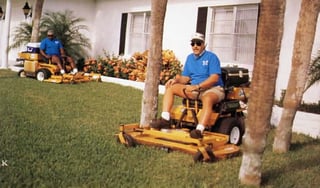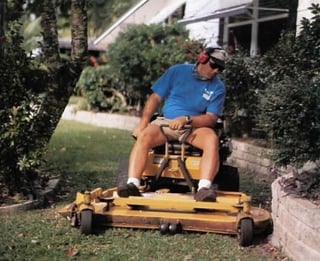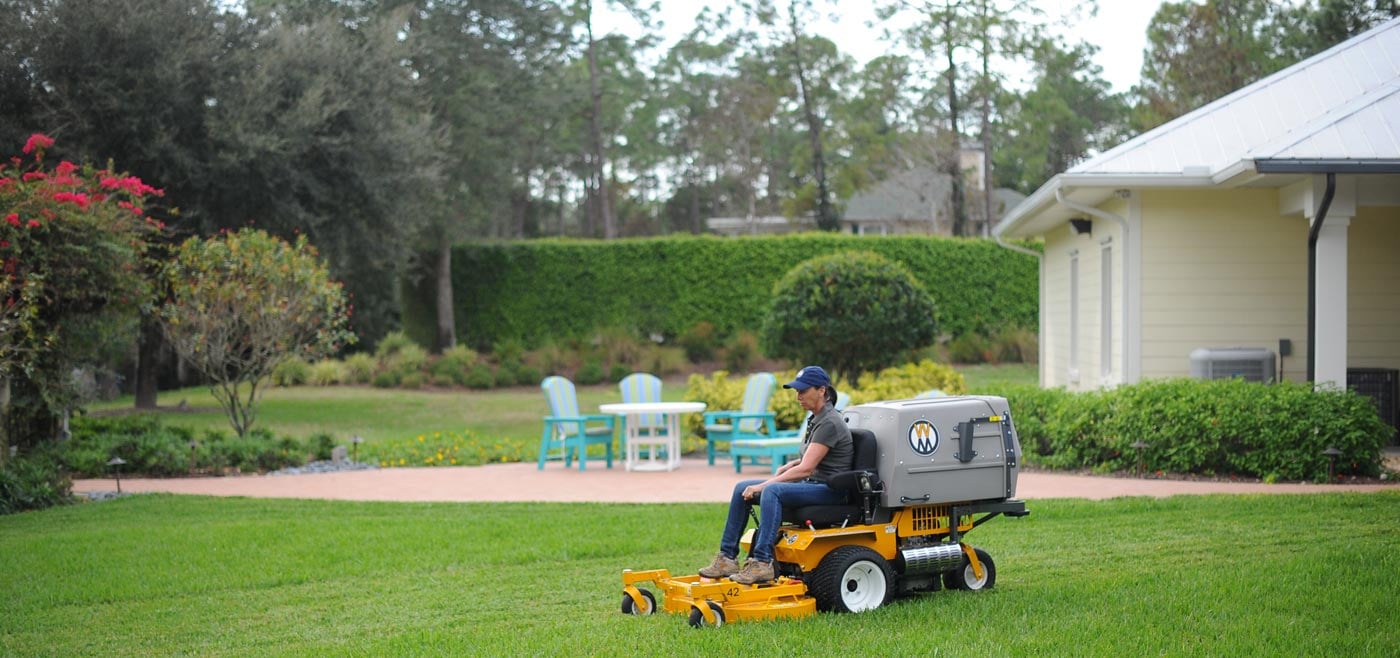The routine is the same every Monday morning. Mark Fagnant and Leroy Collins line up their two Walker mowers. Then they peer down a one mile stretch that cuts through the center of Colonial Colony South. To the right and left of this road are more than 570 retirement homes, comprised of single and double-wide manufactured homes.  Each has a distinctive landscape and a sizable patch of St. Augustine grass. Fagnant's and Collins' job is to mow each lawn in this community, then traverse a couple of miles down the road to Colony in the Wood to tackle another 380 plus homes before the mowing week ends.
Each has a distinctive landscape and a sizable patch of St. Augustine grass. Fagnant's and Collins' job is to mow each lawn in this community, then traverse a couple of miles down the road to Colony in the Wood to tackle another 380 plus homes before the mowing week ends.
When the job is completed on Thursday evening, the mowing crew will have tallied up approximately 40 hours on each Walker and mowed more than 900 yards.
"This is a lot of mowing," tells Roger Shulzinsky, who supervises the mowing crews and oversees both communities and a third one, all in Daytona Beach and all owned by the Shaddix family. "Before we purchased our first Walker two years ago, it would take four men two days to mow just one of the communities," he emphasizes.
When you're talking this volume of grass, speed and productivity are important. But so is the quality of cut and other tangibles such as being able to mow in wet conditions, having the capability to mow without "sinking" into the turf, and mowing without downtime. According to Shulzinsky and his mowing crews, with the Walkers, Colonial Colony has the best of all worlds.
 Evolutionary Path
Evolutionary Path
Mowing wasn't always this easy at the retirement village. Nor was the Walker mower the company's first choice. In fact, when Colonial Colony tried its first Walker out in the early 80s, the mower was passed over for what was thought to be a lack of capacity for the big job at hand. Instead, mowing crews went with a collection of intermediate sized walk mowers and outfront cutters. It wasn't until two years ago, when Port Orange Mower demonstrated a Walker, that the mower was reconsidered.
"Mark is really the one who said we needed the Walker," tells Shulzinsky. "After raking it for a spin he said, "this is just what we've been looking for."' Fagnant got his way and the company bought its first Walker, which now has 2,000 trouble-free hours on it. The unit was followed up by a second, now with better than 1300 hours, and a third one last year. Each is equipped with a 54-inch side discharge deck (there is too much grass to catch). They get lubricated every day, blades are changed twice a week and oil and filter are changed weekly.
There's a bonus about operating the Walkers, notes Shulzinsky: "Our maintenance costs are down to almost nothing."
The Walkers have allowed mowing crews to set some incredible mowing records. Fagnant, whom Shulzinsky says fashions himself a mowing expert, recently became the first person to single handedly mow Colonial Colony South. If that doesn't seem like much, consider the fact there are five miles of roads in the community and enough "ins and outs" to severely put to test the skills of even the most proficient operators. Mark just shrugs his shoulders and says "it was nothing."
Mowing partner Leroy Collins followed up by doing the same at Colony in the Wood. Today, the crew works in tandem mowing both communities. They alternate sides weekly to ensure landscapes receive a little different cut each time. They top off their week by mowing a nearby church property which is an additional 2 1/2 acres.
Colonial Colony South and Colony in the Wood are mowed somewhere between 37 and 42 times a year, depending on the weather. Lawns are mowed higher in the summer so grass plants can shade themselves from the intense Florida sun. As the winter mowing season approaches, the decks are lowered one notch at a time, first the front, then the rear of the deck - and again, until the cut shaves off an additional 1 1/2 inches. "You have to lower the deck in stages," explains Shulzinsky, "because of the sheer volume of grass." The process is reversed to accommodate the summer growing season.
'The Walkers seem like they are designed for the tough conditions in the village," tells Shulzinsky, an employee of Colonial Colony since the mid 60's. It's their compact size and maneuverability that really sets them apart from the competition, he adds, citing an incident last year when a dealer came by with a different brand mower. "He never even unloaded the unit."
 Unique Village
Unique Village
To be sure, Walker mowers and Colonial Colony seem made for one another. Both are special, says Shulzinsky.
The communities represent a cross section of the population. As Shulzinsky tells, there are people from all "walks of life," including a one-time Mr. Universe and the oldest living Shriner. The latter, Albert, is 108 years old, still drives and has yet to have an accident after 90 years of being behind the wheel. Whew!
A monthly fee at each community covers all community services: city water and sewer, deep well irrigation water for lawns, mowing, fertilizing, and spraying for chinch bugs on all lawns. Also included are garbage and trash removal, basic and extended television service, courtesy bus and use of the recreational facilities.
Most of the services fall within Shulzinsky's domain. For fertilizing, he toggles up a pull-behind spreader to a Walker mower. The set-up, which is highlighted by a cable mat allows the operator to turn tl1e spreader on and off from the Walker seat, applies 15 tons of fertilizer twice a year. He also orchestrates the garbage pickup and is quick to help residents locate outside contractors for services that don't fall wimin the community's jurisdiction, e.g., inside plumbing and painting homes.
Virtually everything else is taken care of Income for the facilities is derived primarily from the monthly "rental" fees and care is taken to keep costs in line so fees don't outstrip the fixed income of residents.
That's one reason why the Walker mowers fit so well, explains Shulzinsky. "The other mowers had so much downtime, it kept one of our key employees busy almost daily repairing them. "Remove the lost time associated with downtime, remove the expense of the same, and subtract the number of man-hours saved by using only two mowers and employees instead of four year-round and cost savings add up... to the extent Colonial Colony plans to buy another Walker next year and reassign its oldest one to Colony North. The odd mower out will still be used as a backup, to cover on those rare occasions when the heat and rain combine to outstrip mowing capacity.
In the meantime, look for more mowing records to be set this year.




 Site Search
Site Search



